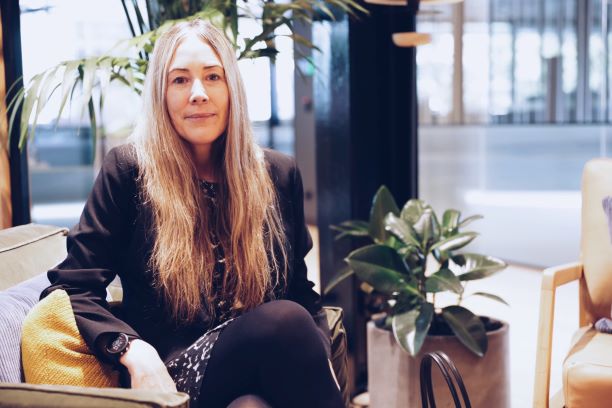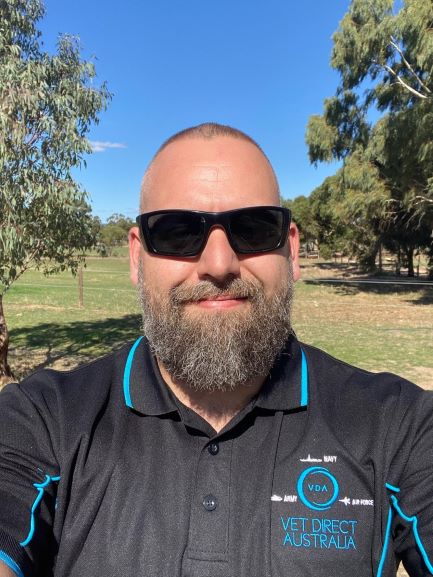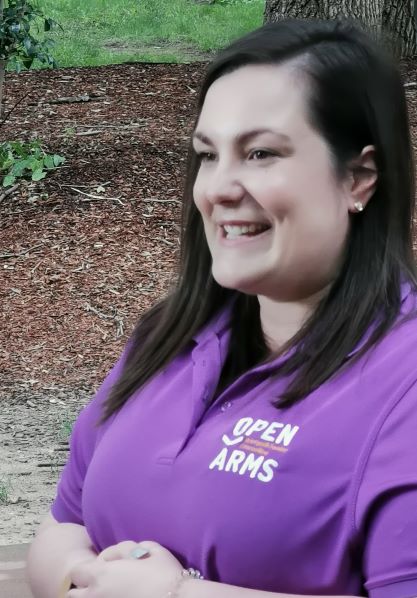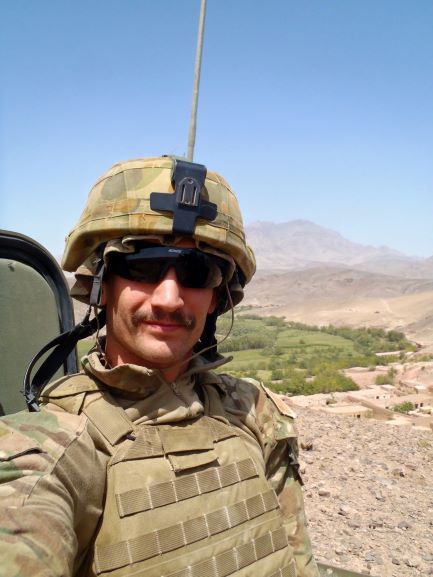Open Arms, Open Conversations
Open Arms’ new audio series presents stories of recovery from the veteran community. We thank Dannii, Matt, Kristy and Kyle, and hope their stories empower others to take the next steps in their mental health support journey.
Dannii

Dannii, the daughter of a Vietnam veteran, knows that recovery isn’t a linear journey. She grew up in a household where her father’s chronic PTSD meant she and her brother wouldn’t know what the next day would bring.
‘As a child, it was really, really difficult for me and my brother, in that we were always in this hyper-vigilant state. He was never violent, but he did self-medicate with alcohol, and also the continued flashbacks that would happen. My father lost his life to PTSD when he was 58.
So, I developed a severe and enduring eating disorder partly because of the trauma that I had as a child. After my third suicide attempt, I was in Melbourne’s Alfred Hospital in intensive care. And it was that third and final attempt that I had the opportunity through Alfred Health and their psychiatric services to access Open Arms because there wasn’t a lot of other support options.
I thank Open Arms for changing my life. I had been receiving psychiatric support for my eating disorder, depression and anxiety and trauma for many years. And it wasn’t until I accessed Open Arms and I spoke to a great psychologist, his name is Matt… it changed my life. He allowed me the space to grieve for all those lost years and everything that happened, and he also gave me hope.
We spoke about quality of life. He said to me, Dannii, you will get through this. We will work through this. You will get a job and have your own place again. You’ll have friends again, you’ll be able to live a good life. And it was about rediscovering that sense of identity that can be lost to veterans, families, to children of vets through all this trauma, you lose your sense of self sometimes because you’re stuck, so wrapped up in the trauma.
I still live with complex PTS and anxiety, but I have tools, I have strategies, I have positive, healthy ways to cope. I call myself fully recovered. I work as a mental health practitioner now in Victoria, because I thought if Matt can do that for me, I want to be able to do that for somebody else.
No matter what sort of trauma, no matter what sort of past, if you’re willing to do the work and you’re willing to reach out and put trust in somebody, like Open Arms, your whole life can change.’
Matt

When Matt transitioned from the Navy to civilian life he found himself isolated and unstable.
‘When I was in the military, I had three mates that I served with. They committed suicide within 18 months. And one of those guys I lived with, and served on the same ship with, and he tried taking his life for about 12 to 18 months, between two to five times a week. And I tried to keep him alive for that time.
When I transitioned out of the Navy I went to Tasmania. I didn’t grow up there, I moved there for my partner and my daughter. I’d never been there, I didn’t know anyone; and in that sense, I was already isolated. I had to make the decision to leave Tasmania to go to one of the states that had the help (I needed). And I knew leaving my daughter meant I would never see her again because of the relationship with her mother, and that was a hard decision.
I was suicidal. I was drinking a bottle [of alcohol] a day, completely closed off from the world. To make that decision was extremely hard. But I made the decision. I ended up coming to South Australia and going to a place called Ward 17. And that’s where I heard of VVCS [Vietnam Veterans’ Counselling Service – now Open Arms] and I started getting counselling.
Essentially, when I got out of Ward 17, I just kept drinking. And that went on for four or five years, and I kept going in and out of hospital. I kept going back to Open Arms. I kept testing the waters before I was ready to actually help myself.
I did want the help. And it took me many, many years to start asking the right questions of myself. So, once I started to ask those right questions, then the counselling started working. I think the challenges that I faced was finding someone I could connect to. And it’s not they’re bad counsellors, it’s just you find that person that you get along with.
I’ve been suicidal and I’ve called Open Arms at midnight absolutely a wreck, ready to take my life. And the person that I’ve spoken to is that person on the frontline. And yeah, I just wanted to say thank you to those people. To be honest, I wouldn’t be here without those people because those are the people that have really helped me and got me through.
Now that I am on my way to recovery, I’m sober, I just enjoy being around my kids. I run my online directory, Vet Direct Australia. I find that it gives me purpose. If it can just reach that one veteran and save that one vet, that’s job done for me.’
Kristy

Kristy is from a military family and joined the Navy straight out of high school but was medically discharged two years later with a serious back injury. She’s now an Open Arms Community and Peer Advisor.
‘I am married to a veteran and my family has quite a rich history of serving in the ADF as well. My grandfather is a Vietnam veteran. I had a really positive experience when I was in service. I still speak to a lot of people today – some of my closest and dearest friends I served with. It’s like a big family.
I transitioned out in December of 2009. I felt really isolated. I didn’t have a great deal of support. I didn’t know what I could access. For me, joining the military was something that I wanted to do for a really long time and I had big dreams, big career dreams that I never got to fulfill.
So, leaving at such a young age and only after such a short period was a big shock and there was a grieving process as well attached to that. And it took a really, really long time to find a new path. After having my third baby, my mental health nose-dived. And there was a lot of unprocessed grief and trauma from my military experience that had sort of compounded. And also postnatal depression was the cherry on top.
I still remember making the first call to Open Arms... I didn’t feel like I was being judged. I didn’t feel like I was crazy. I didn’t feel like I was different. It was just a normal conversation. Accessing Open Arms was probably life-saving, to be able to have that support in working through some of the most challenging times of my life meant that I could do and be what I am today.
In the bubble of Defence when you sign up, when you become a member of the ADF, it’s not just you that becomes a member, it’s your whole family. So to be able to include that within our eligibility criteria I think is absolutely fantastic.
I love what I do. It’s challenging to support people at sometimes their most vulnerable times in their life. But being able to support families and from that lived experience perspective as well, to share the journey and to support people in knowing that they’re not alone.’
Kyle

Kyle was a cavalry crewman (driver) who deployed to Afghanistan. Upon returning home, he began suffering from PTSD and turned to heavy drinking and drug use as a way to cope. He now provides veterans with the kind of support that saved him as an Open Arms Peer Worker.
‘I didn’t know what was happening, to be honest. I didn’t know much about mental health. I just sort of was living it day to day and I thought this was normal. I would be just having more regular panic attacks. Even my best friend at the time I was living with, I think he was struggling too, but we never said anything to each other. We just drank and drank our problems away, or tried to at least.
The final straw was for me having a final panic attack where I thought I was going to die. And that was it. That was me sort of reaching out for help after that. I look back now after being 10 plus years and I wish I could see my first psychologist and just thank her.
Things that I’m doing regularly are exercise, eating right and sleep. You know, sleep is the tide that rises all boats. It’s also exercise. I catch up with friends. I’m having a social connection, but also getting out in nature and doing some solo hikes. Mainly I work with people that like social connection. Getting out of the military, you lose a lot of that camaraderie and it’s linking them in with different social connection.
None of my two peer clients have ever been the same. And that’s what the beauty of peer support is. It’s really focused about what they need at that time, and there’s no judgment whatsoever.
And when we get people that are so active in their recovery and they’re ready for it, they just flourish in a space of six to nine months… people are thriving after being linked in with these services or one thing leads to another and they’re able to hold down employment.
You see some people that have been struggling for years and years, decades even, without seeking any help, and how terrible that would be… Don’t suffer in silence, it’s the worst thing that you can do, because a problem shared is a problem halved. Once you say you’re not okay to the right person, it’s like a domino effect – these amazing things can happen for you.’
Listen to their stories: openarms.gov.au/resources/audio-seriesopen- conversations
If you, or someone you know is struggling, Open Arms’ trauma informed and military-aware support is available any time, day or night. Call 1800 011 046.
